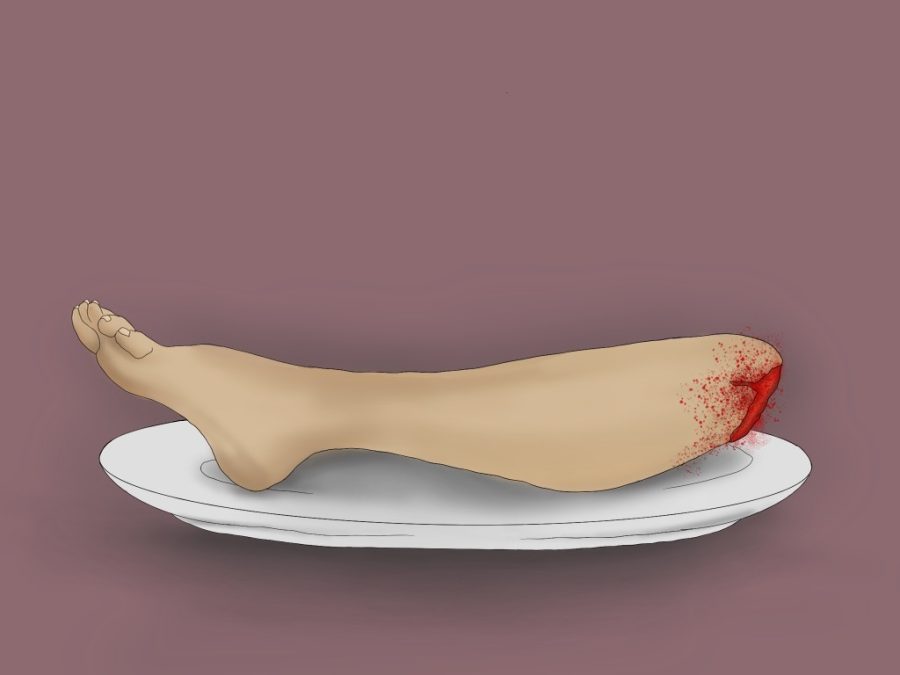Review: ‘Fresh’ proves women bite back
Mimi Cave takes the commodification of women’s bodies literally in “Fresh” (2022), exploring one of the most unimaginable — yet probably still not the worst — possible outcomes of dating a man who looks like Sebastian Stan.
“Fresh,” directed by Mimi Cave, is a comedy thriller that depicts a dating experience gone horribly wrong. It stars Daisy Edgar-Jones and Sebastian Stan. (Staff Illustration by Aaliya Luthra)
April 5, 2022
Women are conditioned to view men as one of two things: a threat or a romantic interest. More often than not, it’s the former.
“Fresh” opens with a shot of Noa (Daisy Edgar-Jones), whose date has just texted “FYI, this place is cash only” regarding the restaurant they’re going to — before they’ve ever even met in person. The list of truly repulsive personality traits that follows, although comically long, is all too familiar. Noa’s date, a scarf-wearing Chad (Brett Dier), is rude to the waiter, talks only about himself, remarks on how he wishes women were “still feminine” and compliments Noa at the end of their date — in a clear attempt at sleeping with her — only to immediately become aggressive following her rejection. Directed by Mimi Cave, “Fresh” is a movie about cannibalism, but it’s also a movie about how dating as a woman is so bad that a man like Chad is almost less appealing than one who literally wants to eat you.
Noa’s first interaction with Steve (Sebastian Stan), which takes place the day after her date with Chad, has all the makings of a meet-cute — a term that has rightfully evolved from describing exclusively fairytale-like rom-com moments to any time you actually meet someone outside of a dating app. As their relationship progresses, Steve conveniently reveals that he has every possible desirable quality in a man, surface-level and otherwise. He’s attractive and charismatic, of course, but he’s also a surgeon, close with his family, “doesn’t eat animals” and, most surprisingly, is reluctant to sleep with Noa on their first date. However, Stan excels at playing manipulative, violent men, and the film truly begins once he’s broken the facade by luring Noa to his secluded home and drugging her.
“Fresh” equates cannibalism with power, falling somewhere between the grotesqueness of “Wrong Turn” and the almost surgical nature of “Hannibal.” Cave — in a moderately feminist, although not at all revolutionary take, turns the commodification of women’s bodies into their literal commercialization, establishing the ever-present idea that women are only valuable when they can be of service to men, and even then that value is only temporary. Women like Noa are blamed for their naivete, while men like Steve cruise through life with a baseless sense of entitlement and dangerous lust for control.
While Stan’s performance — though a little too heavily influenced by “American Psycho” — is arguably the true winner, Edgar-Jones also proves her range extends far beyond what was explored in “Normal People.” Disappointingly, however, Mollie (Jonica T. Gibbs) does, at times, fall victim to the Black best friend trope, adding to an already underdeveloped exploration of the relationship between race and violence against women. At the same time, the film is as much a comedy as it is a thriller, attempting to satirize these overused cliches rather than becoming another statistic in the list of films that rely on them.
Cinematographer Pawel Pogorzelski’s treatment of flesh and the human form in the film takes on a personality of its own, particularly when it comes to the shift from sensual to sinister. The brightly-lit, oversaturated visuals paired with an incredibly curated soundtrack add to the playful atmosphere of the film, differentiating it from other treatments of the standard cannibalism narrative. For such an in-your-face film, one of the most entertaining aspects of “Fresh” is its subtleties, from the “Fresh Meats” sign above Noa’s head when she first meets Steve to the “Blue Lives Matter” post that appears on Steve’s wife’s Facebook feed as Mollie is scrolling.
“Fresh” culminates in an abrupt, blood-drenched, yet ultimately satisfying final act, punctuated by a text from Chad that reads, “u up?” The film is a hilarious, cynical take on dating and navigating the world as a woman who is both destined to be a victim and subjected to a fate of being villainized for said victimhood. If “Fresh” teaches us anything, though, it’s that even after the most traumatic experience of your life, there will always be an insufferable man named Chad that wants to sleep with you.
Contact Lorena Campes at [email protected].

























































































































































